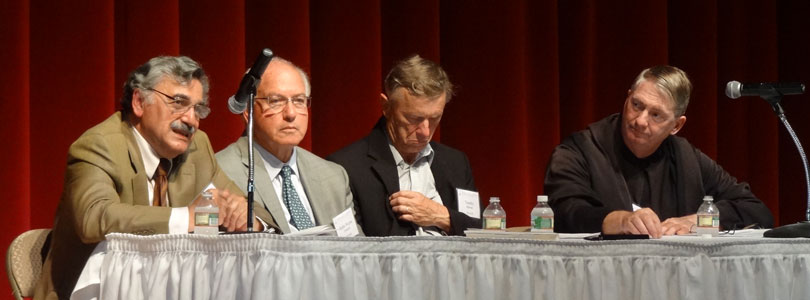Thoughts on Portsmouth Institute Panel on Interreligious Perspectives on Pope Francis
The second session at this year’s Portsmouth Institute conference, with the weekend-long subject of Pope Francis, took up the topic of interreligious dialogue and Pope Francis’s role therein (full video at the bottom of this post). A bit of irony snuck in around the edges of the conversation (which more resembled a series of individual speeches): An initial impression of Francis’s popularity — in the United States, anyway — would seem to have much to do with the political application of his theological views. Yet the speakers on the panel held him up as a lesson to religious groups that have sometimes gotten caught up in their blending of politics and religion.
Most dramatic, in this regard, was Ali Banuazizi, a professor in the Program in Islamic Civilization and Societies at Boston College. In Banuazizi’s telling, Muslims once saw the relationship of the Christian West and the Islamic East as a sort of territorial division, as if to say, “That’s what they’re about, and this is what we’re about.”
As trade expanded and these regions began to expand toward each other, the societies’ interactions were built around economics and politics, not religion, but responding to “arrogant” Western powers (e.g., Napoleon), Islam became politicized in the Nineteenth Century as a means of giving momentum for the Islamic world to “stand up to the West” with what they saw as their “authentic religious cultural identity.”
Now, with the “sacralization of politics,” governments or groups acting out of political and economic motives look to Islam for justification (an “ideological weapon” against other Muslims and the West). The idea of “Islamophobia” as a mirror-image provocation to Muslims portrays opposing views as founded in simple animosity against the religion.
In Banuazizi’s assessment, Islam is particularly difficult to repair, in this regard, because it does not have a hierarchy that gives particular organizations or leaders authority — or at least credibility — to interact with those of other faiths and smooth out misunderstandings. This arguably makes Islam vulnerable to exploitation for factional purposes.
An echo of this dynamic could be heard when Gordon College professor of American Politics Timothy Sherratt took the microphone on behalf of Protestants. Himself a convert from Anglican Protestantism to Evangelical, Sherratt suggested that Evangelicals “hover” between an impulse to be culturally separatist and zealous to reclaim the culture.
In that context, he said, Pope Francis is a model of cultural confidence with “good instincts for engaging his hearers” — for bringing the subject back to Christ, rather than the political conclusions that a particular religious group prescribes. The balance the pope strikes, here, keeps “the Good News… free from ideological capture.”
This point brings us to the principle with which Rabbi Franklin, of Temple Emanu-El in Providence, opened his portion of the session. He noted that Jewish theologians see Noah as “blameless in his generation.” That is, he was righteous mostly in comparison with his sinful times. In contrast, Abraham was righteous in a timeless way. The rabbi closed suggesting that Pope Francis is righteous in the way of Abraham, rather than Noah, but it’s surely too early to tell.
If, as I pondered last week, Pope Francis has been taught by his experiences to react to the world as if it is post-collapse, and if, as it seems from the United States, the world on the whole has not yet reached that point, then he may not be seeing the world fully as it is. We can have faith that God is working through him in the way that most serves His will and us, as His children, but that’s an observation of God’s power, not the pope’s righteousness.
Francis’s statements, while certainly not partisan, are notably not outside of politics, and if they aren’t rooted in the world as it is, they may draw those who agree on the politics while pushing away those who don’t.
Featured image shows, from left to right, Ali Banuazizi, Rabbi Wayne Franklin, Timothy Sherratt, and Father Gregory Mohrmann.


